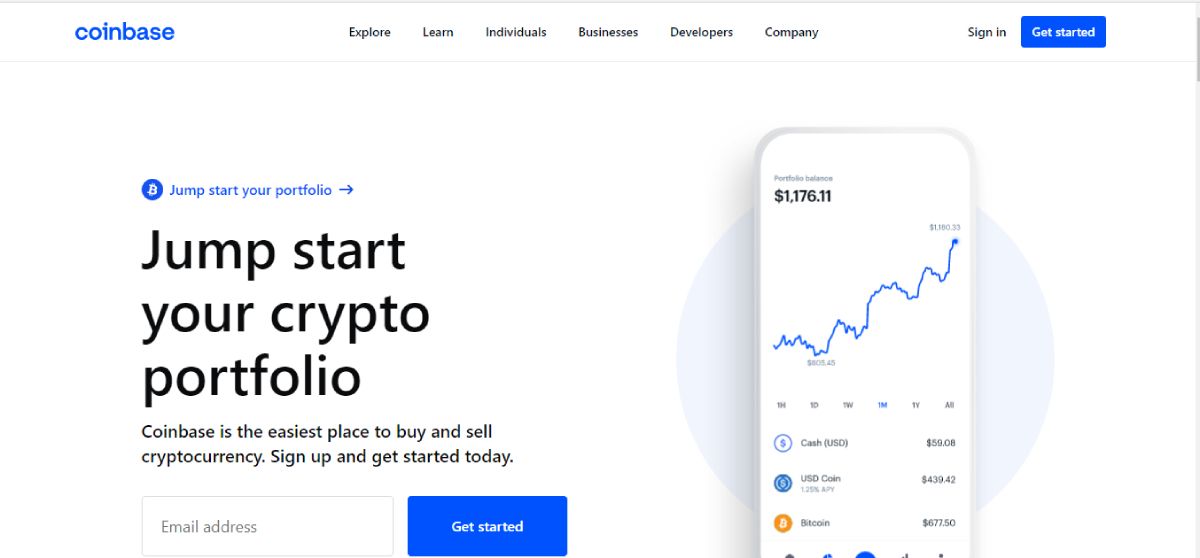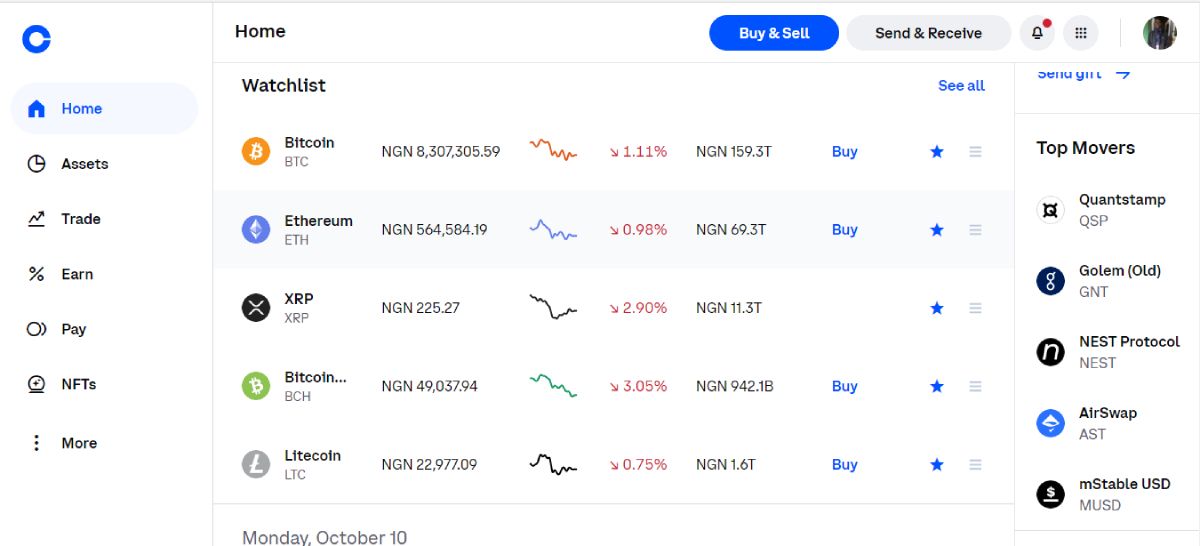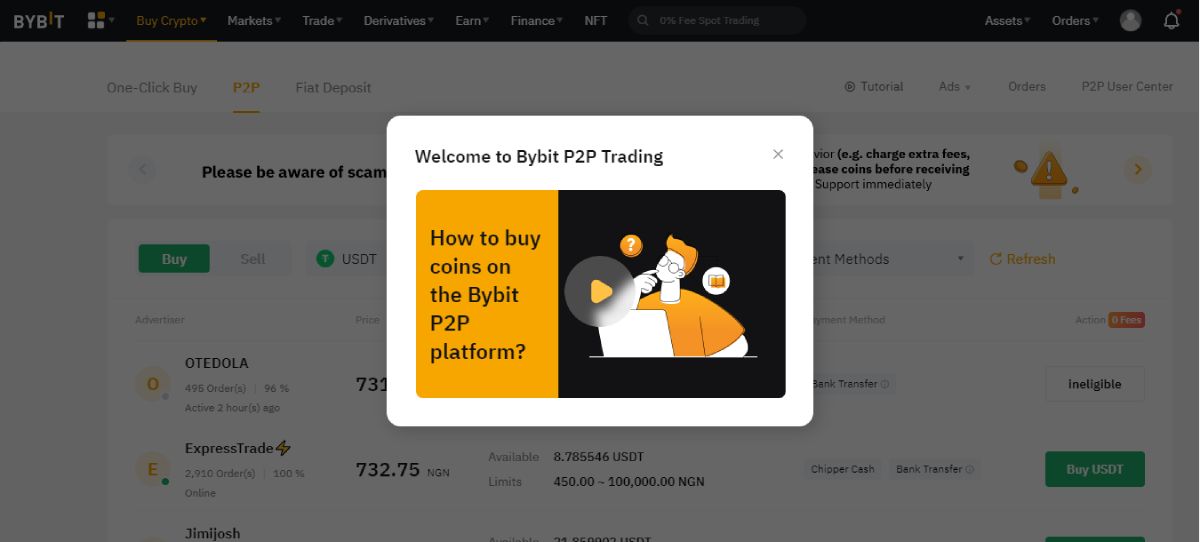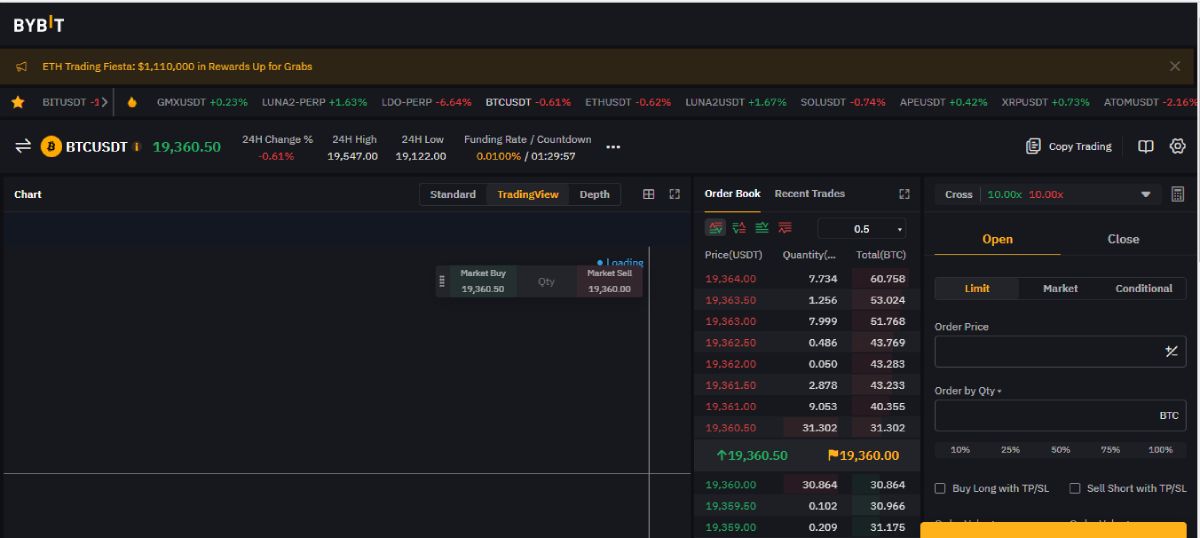Coinbase and Bybit are two of the top spot exchanges in the world. Both are global exchanges, which might make you wonder which is better for you?
Let's compare the two exchanges' important features to help you choose between them and determine if Coinbase or Bybit better suits your crypto trading needs.
Coinbase Overview
Coinbase is the biggest crypto exchange in the U.S. and among the biggest worldwide by trading volume. Created in 2012, the exchange went public in 2021, making it the first crypto exchange to take such a step.
It is also one of the most reputable options and is mostly preferred among American traders and investors. Coinbase's main selling point is its simple user interface (UI) that beginners in crypto find easy to navigate compared to other advanced platforms like Binance.
A more advanced version known as Coinbase Pro was created to offer advanced traders more options than the basic Coinbase UI. Although they are two different platforms, Coinbase and Coinbase Pro are owned by the same company.
Bybit Overview
Bybit is a spot and derivatives crypto exchange based in Singapore. The exchange was founded in 2018, six years after Coinbase, and has steadily gained acceptance among crypto traders and investors.
The main aim behind creating Bybit was to provide a one-stop platform for all things crypto. So far, the exchange is doing just that by providing a wide range of services in the crypto space, including buying and selling crypto, an NFT marketplace, bot trading, peer-to-peer (P2P) trading, copy trading, and so much more.
Because of the wide range of services that Bybit provides, the exchange is ideal for both experienced and new crypto investors and traders.
Coinbase vs. Bybit: Supported Assets
Coinbase supports a sizable number of crypto assets, giving traders reasonable options to choose from. However, it is not by any means the exchange with the highest number of supported assets in the space.
It currently supports over 200 cryptocurrencies, including Bitcoin, Ethereum, and many less-known altcoins.
Bybit, on the other hand, supports over 100 cryptocurrencies, with well over 200 trading pairs. This makes Coinbase the exchange with the higher number of cryptocurrencies, so Coinbase wins in the number of supported assets.
Coinbase vs. Bybit: Supported Countries
Coinbase has a wide coverage of 106 countries across continents, a significant number compared to other exchanges.
Bybit is available in all countries where the regulatory climate allows it to thrive. The only countries where it is not available due to local laws are the U.S., Quebec in Canada, Crimea, Iran, North Korea, Sudan, Cuba, Syria, Mainland China, and Singapore.
If you don't live in any of the listed countries and regions, you can freely access and use Bybit. In terms of supported countries, Bybit is better than Coinbase.
Coinbase vs. Bybit: Fees
Both Coinbase and Bybit use a maker-taker fee model to charge fees on trades. The following table compares the spot maker and taker fees for top crypto exchanges, including Bybit and Coinbase.
|
Exchange |
Maker Fee Rate |
Taker Fee Rate |
Net Fee Accrued to Platform |
|
Bybit (Non-VIP) |
0.10% |
0.10% |
0.20% |
|
OKX |
0.08% |
0.10% |
0.18% |
|
Binance (VIP 0) |
0.10% |
0.10% |
0.20% |
|
Huobi |
0.20% |
0.20% |
0.40% |
|
Kraken |
0.16% |
0.26% |
0.42% |
|
Gemini |
0.25% |
0.35% |
0.60% |
|
Coinbase |
0.50% |
0.50% |
1.00% |
|
Bitstamp |
0.50% |
0.50% |
1.00% |
The net fee accrued for Bybit is 0.20%, while the net fee for Coinbase is 1.00%.
Coinbase also charges fiat deposit and withdrawal fees, depending on the method used. The deposit and withdrawal fees are shown below.
|
Deposit Fee |
Withdrawal Fee |
|
|---|---|---|
|
ACH |
Free |
Free |
|
Wire (USD) |
$10 USD |
$25 USD |
|
SEPA (EUR) |
€0.15 EUR |
€0.15 EUR |
|
Swift (GBP) |
Free |
£1 GBP |
In addition to deposit and withdrawal fees by method, Coinbase charges fees for deposit and withdrawal based on region. The following are fees charged for US users' fiat deposits and withdrawals.
|
Payment Method for Purchase or Payout Method for Sale |
Effective Rate of Conversion Fee (After Waiver) |
|---|---|
|
U.S. bank account |
1.49% |
|
Coinbase USD wallet |
1.49% |
|
Debit card buy |
3.99% |
|
Instant card withdrawal |
Up to 1.50% of any transaction and a minimum fee of $0.55 |
Crypto deposits are completely free on Coinbase, but withdrawal fees apply and vary widely depending on the crypto asset involved.
The following is a breakdown of flat transaction fees on the exchange by trading volume.
|
Total Transaction Amount |
Transaction Fee |
|---|---|
|
$10 or less |
$0.99 |
|
More than $10, less than or equal to $25 |
$1.49 |
|
More than $25, less than or equal to $50 |
$1.99 |
|
More than $50, less than or equal to $200 |
$2.99 |
Like Coinbase, Bybit also charges withdrawal fees, but deposits are free. The withdrawal fees are shown below as well. Note that you can only withdraw cryptocurrencies and not fiat on Bybit.
|
BTC |
ETH |
XRP |
EOS |
USDT (ERC20) |
USDT (TRC20) |
DOGE |
DOT |
LTC |
||
|
Withdrawal Fee |
0.0005 |
0.005 |
0.25 |
0.1 |
10 |
1 |
5 |
0.1 |
0.001 |
0.02 |
The fees apply to minimum withdrawal amounts of the respective assets. The breakdown clearly shows that Coinbase charges more fees than Bybit, so Bybit wins in this regard.
Indeed, Bybit is among the top crypto exchanges with the lowest fees.
Coinbase vs. Bybit: Security
Coinbase takes security very seriously, as is evident from security measures such as cold storage of most of the users' funds. It is also a fully regulated exchange in the US, giving it credibility. Coinbase has been hacked a number of times, though, and users have lost funds.
Bybit also has security as a major priority. It has employed such measures as cold storage for users' assets. In addition, it has never been hacked, probably because it hasn't been around for ten years, like Coinbase.
However, for the sake of this comparison, Bybit wins in terms of security since it has a clean record so far.
Coinbase vs. Bybit: Ease of Use
A crypto exchange must be easy to use, even for beginners. Both Coinbase and Bybit boast of being beginner-friendly, but which is easier to use?
Well, Coinbase has a clean UI with every important feature clearly laid out so that you just need to click the buttons and get things done. While that sounds obvious, its intuitive design is why it is reputed as the top exchange for beginners.
Bybit also has a beautiful design, but the website isn't as easy to navigate as that of Coinbase. In fact, a lot of times, you'll have to search for what you want in the search bar on the website to see it appear. This makes the website quite difficult to navigate initially, but it gets easier as you get used to it.
In terms of ease of use, Coinbase is far easier to use than Bybit.
Coinbase vs. Bybit: Verdict
Have you decided which exchange is most suitable for you yet? If you're a crypto newbie looking for your first exchange, you should go for Coinbase unless the fees are an issue.
If you're quite used to crypto exchanges and looking for a secure and affordable exchange, Bybit is what you need.






